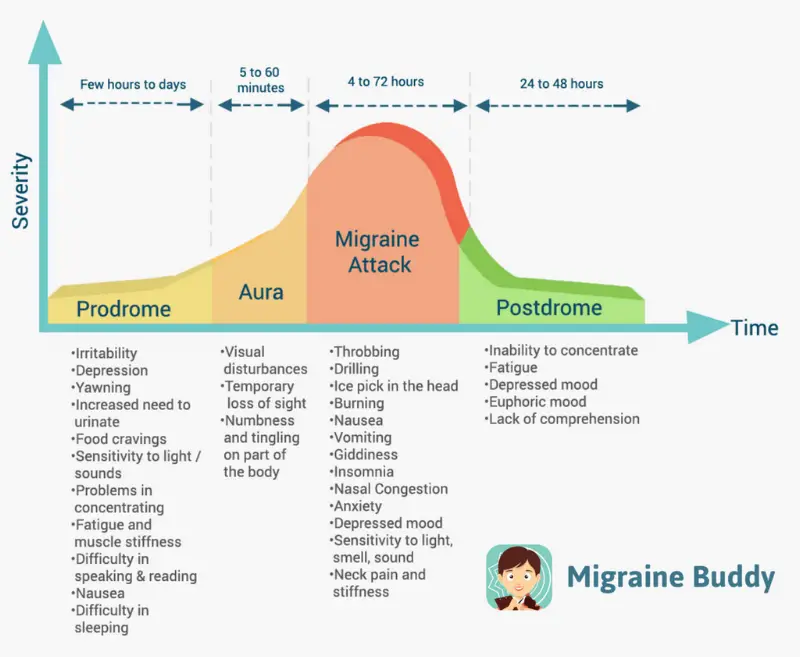In social media, it’s not uncommon to see rants like “if one more person tells me to drink more water to help migraines!” Or the sarcastic, “Gee, why didn’t I think of that. A glass of water to cure me of this disease I’ve had for 30 years.” When well-intentioned friends or family members suggest drinking more water as a remedy to our aching heads and neurological weirdness, I think most of us just bite our tongues while a few others may fire off a flippant response. But, does drinking water help migraines? Let’s take a good look.
** This article is written for information purposes only. It is not medical advice or a substitute for medical advice. Consult your doctor for any changes to your migraine care plan.
Why would drinking water help migraine? Are we more susceptible to dehydration?
What is it about migraine that makes us more prone to dehydration headache and migraine attacks? Is there science behind this? Yes.
For some people, the kidneys increase the amount of urine we make during the prodrome phase of migraine.

Prodrome is the phase that some of us experience in the hours (or days) before the actual attack becomes obvious. American Migraine Foundation’s graphic and description of the stages of migraine provides a great visual in addition to the above graphic from Migraine Buddy.
If nausea is part of your prodrome it’s not a surprise that keeping hydrated to fend off the attack or abort the attack would be especially hard. Who wants to keep drinking when you have the queasies?
** While Migraine Strong writes about the latest in migraine treatments, this is not medical advice. We are patient educators and all information you read should be discussed with your doctor.
My personal anecdote about this odd symptom
I had heard anecdotal stories of people saying that they need to pee a lot and/or seem thirstier before migraine, but I had not seen it mentioned in any studies before. A few weeks ago, this symptom became apparent to me. I was not at home so I became more aware of needing to search for public bathrooms.
I didn’t just have an uptick in the sensation of needing to go. My bladder kept filling up even though I didn’t feel especially thirsty nor was I drinking much more. Sure enough, later that evening I sensed familiar head pain followed by jaw pain and knew a migraine attack was on the way.
So, if you consider increased urination plus the common complaint of gastrointestinal issues before migraine is in full swing, it seems logical that some people would be more prone to dehydration headache and migraine. Logically, drinking water would be helpful to prevent headache and migraine.
Science supports drinking water to help migraine.
Do we need to just avoid dehydration or do people with migraine benefit from additional fluids?
It turns out that there are 2 nice but small studies that suggests increased water intake improves migraine pain symptoms AND occurrences. In this study, there was a reduction in intensity and frequency of migraine headache. It is well-accepted that there is a relationship between dehydration and migraine. Perhaps this study plus lots of anecdotal experience of emergency room doctors, neurologists and headache specialists suggests that keeping a steady flow of additional water may be helpful in reducing our frequency and intensity of migraine. The study supports increasing water by 1.5 liter/day as a preventive strategy to reduce migraine.
In the second study on 256 women diagnosed with migraine, the study results confirm that drinking water does indeed help migraine headaches: “The results showed that “the severity of migraine disability, pain severity, headaches frequency, and duration of headaches were significantly lower in those who consumed more water or total water.”
Can fluids help treat an active migraine attack?
The standard of care in many emergency departments is for giving intravenous fluids for people with migraine. The authors of an often referred to guide on acute migraine treatment said, “fluid replacement is arguably an under-appreciated aspect of acute migraine therapy.”
So, it looks like the answers to both questions above is YES. Having migraine makes us more prone to dehydration headache and migraine attacks. And, people with migraine benefit from additional fluids to prevent and treat attacks.
Prominent headache specialists agree that drinking water helps migraine
The body of observational evidence from experts and people who get frequent dehydration headaches and migraine cannot be denied.
Many or most doctors certified in headache medicine will tell you that dehydration is a top trigger. After stress and poor sleep, dehydration is probably mentioned as a top trigger for a headache that starts the cascade into the usual migraine symptoms. It’s not a cause, but a trigger.
According to Dr. Cynthia Armand, assistant professor of neurology at the Montefiore Headache Center at Albert Einstein College of Medicine, “The final key component of good headache hygiene is consistent hydration. We know dehydration is the biggest, most potent trigger for migraine, so hydrate, hydrate, hydrate!” Dr. Armand’s video about “headache hygiene” on the American Migraine Foundation’s site is quite good. I’m sure most of her patients get the message about dehydration headache and migraine. The woman is on a mission!
“How Fasting, Weight and Dehydration Affect Your Brain,” by Dr. Elizabeth Leroux, director of the Montreal University Headache Center was a great interview during a Migraine World Summit. The doctors acknowledge that hearing “drink more water” can be infuriating to a struggling patient, but the advice is important to the overall management of migraine. So rest assured, no one is saying drinking water will cure your migraine disease. But, we are saying it’s an important piece of your treatment pie.
How much water do we need to prevent dehydration headache and migraine?
The information in this video from NutritionFacts.org has lots of interesting information about the current water recommendations for men and women. The recommendation is for 4-7, 8 ounce cups per day for women and 6-11, 8 ounce cups for men assuming ambient temperature and moderate activity levels.
For many of us, this amount of fluid may seem daunting. Couple that info with the information from the study suggesting the benefit of adding another 1.5 liters of water to your day and you just might stop reading this article here. Please don’t get overwhelmed. Baby steps!
My tips at the end of this article will help you get on the right track if you have camel-like tendencies.
But first, let’s go over some challenges specific to migraine and hydration.
Hydration when you have GI distress
Nausea, vomiting, diarrhea and constipation are all common complaints for those of us with migraine. Often, these symptoms are part of the migraine attack and resolve when the attack lifts. Other times these symptoms are frequent nuisances or incapacitating. Let’s explore how hydration and dehydration impact common GI symptoms.
Nausea and Vomiting
Did you know that nausea can be a symptom of dehydration? Yes, it can be both a symptom as well as a cause.
When nausea is a symptom of dehydration
While researching studies for this article, I came across a few studies with athletes looking at dehydration and GI distress. The nausea associated with exercising while dehydrated was attributed to delays in gastric emptying time. Since it is already known that some people with migraine have delayed gastric emptying during and sometimes in between migraine attacks, perhaps even mild dehydration may contribute to nausea for people prone to migraine attacks. This is conjecture on my part.
According to the American Heart Association, another possible reason for dehydration causing nausea is that being dehydrated may cause a decrease in blood pressure. A common symptom of low blood pressure is nausea.
Also, did you know that in general, people with migraine tend to have lower blood pressure than the general public? For more info, check out my article on migraine and blood pressure.
When nausea causes dehydration the reason is obvious. Not many people feel like eating or drinking when they feel green about the gills. It can be a vicious cycle leading to worsening migraine symptoms.
What to do about nausea
If you have a long history of migraine with nausea and vomiting you may have figured out a few things that help you. I highly recommend reading this thorough article with with 15 tips for migraine nausea relief. I promise there will be at least one tip that you haven’t tried before.
If home remedies and over-the-counter drugs don’t help there are good medications for nausea and vomiting (antiemetics). Consider asking your doctor to prescribe the suppository form if you have concerns about keeping the medication down.
Dehydration will only make you feel worse and prolong getting back to feeling normal. A BIG bonus of the anti-nausea meds is that they not only act on neurochemistry associated with nausea relief, but also pain and other symptoms of migraine. Anti-nausea meds double as abortives for migraine and they are not associated with rebound.
These medications are valuable tools in your migraine toolbox. Different nausea meds work on different chemicals in your brain, so you might need to try meds from various classes to find relief. For example, Zofran is a serotonin antagonist while Compazine and Phenergan are dopamine antagonists. If one doesn’t work for your nausea the other might. Ask your doctor for help with different medications.
Constipation
Some people have a natural tendency toward being constipated. For them, increasing fluid is important to stimulate the GI tract to move things along. Water is also important to keeping things soft and movable as it passes through the colon. One job our colon has is the removal of water from stool. So, if your colon is an over-achiever, you need to give your body more water.
Since the new anti-CGRP meds like Aimovig became available, relieving constipation has been a hot topic in doctor’s offices and social media. Read this article for more in-depth information on the subject of constipation.
Diarrhea
There is an association of irritable bowel syndrome with migraine. For many, that means frequent bouts of diarrhea both associated with migraine attacks and in between migraine attacks. Finding the right beverage to replace fluids and electrolytes flushed down the toilet is critically important in keeping you healthy overall as well as keeping a dehydration headache or migraine attack from starting or worsening. You may find that room temperature or slightly warm beverages are tolerated better if your GI tract is especially sensitive.
For those with significant GI distress from vomiting and/or diarrhea, IV fluids and electrolytes may be the only solution to help replace what you’ve lost. Of course, emergency departments provide this as well as some doctor’s offices and urgent care centers. In some areas of the US there are private IV hydration sites that may be a solution to get you back on your feet.
My best tips for drinking more water to help migraine headaches
Here’s what I do plus some tips from people who successfully drink enough each day:
- Set a jug or pitcher aside each day with what you will drink that day (i.e. a full, 1/2 gallon jug). Make sure half is consumed by lunch time. If this amount is too intimidating, start smaller and work up to a larger amount.
- Drink a full glass of water as soon as you get up in the morning and before you have your customary drink (i.e. tea, decaffeinated coffee)
- Make the water more tasty and interesting by adding strawberries, cucumber slices, ginger or mint leaves in the pitcher.
- Experiment with different types of non-sugary beverages that aren’t common migraine triggers.
- Experiment with carbonation and temperature. You may like mild carbonation but not super-bubbly seltzer. Personally, I like drinking Pellegrino from glass bottles as the bubbles are tiny and give me a pleasant sensation. Some bubbles are too perky for me. You may like iced drinks when it’s over 70 degrees outside and room-temperature drinks when it’s cooler. Be mindful of what seems to work better for you.
- Experiment with containers. I love my Yeti thermal cup and bubbly water but there are many other great vessels to try. Drinking is so much easier for me if it’s in my thermal cup and without ice. I like cool, not cold.
- Try some electrolyte replacement powders specific for people with migraine like Oasis from Cove.
- Try one of several smartphone apps that will remind you to drink and track your intake.
- When you feel a migraine attack coming on, set a timer for every 30 minutes and chug 4 ounces of water until you hit your goal.
- Keep a container of water near you at home and/or at work so you can sip it throughout the day.
- Keep a container of water in the car. Consider keeping an insulated tote in the car if you prefer your beverages cold. Here’s a another good option for the car.
Might increasing your hydration help you? You won’t know until you try.
A note about water toxicity
It happens rarely, but there have been instances when individuals drank too much water than their body could handle and became ill with water intoxication. In general, our body can properly handle a lot of water over the course of a day. In order to avoid water intoxication symptoms, do not exceed more than 27-33 ounces of water per hour, on average.
Some final words about the advice about drinking water to help migraine headaches.
As annoying as it is to hear the nagging advice to drink more water, it’s an important piece of the Treatment Pie that we discuss often in our private Facebook group. And, even though we are looking to our doctors to come up with something less mundane than drinking more water, they know it helps.
I find it refreshing when a doctor takes the time to talk about something besides more medications that are expensive, require jumping through hoops for approval and may potentially have significant side effects. What if increasing you water intake helps you feel 30% better?
You may already be drinking all that you need to help your head, but many of us do not, present company included.
This article has been updated and refreshed from its original publication date in April 2020.



Your article is phenomenal. After reading your article, I am considering my temporary migraines that raising up at times is related to dehydration. Thanks for sharing!
Jet
Hi, Jet! Glad you liked the article and I hope focusing on hydration really helps you. – Danielle
This has been so amazing! I am currently in an ongoing 5 day attack of migraine / tension type headache cycle and found the information about drinking really useful! This all started in the heat of summer for me two years ago! At the moment it’s like my head has a tight band around it and I’m experiencing burning/tingling! This article was very appreciated! Drinking more over a prolonged time helps me as well as stress and anxiety management using tiger balm and mint tea!
Hi, Eloise. Thank you for writing. I’m glad you are noticing a difference. It’s so simple and healthy and nearly free. Great job addressing hydration! – Danielle
I really felt relieved after reading your article as I am experiencing my ongoing dehydration triggered headache. I was guessing it was due to dehydration as it occurs every few months when I forget and slack down on my fluid intake. Panadol extra doesn’t seem to help as it reduces and then comes back really strong withing a few hours. It continues for 3-4 days with nausea or vomiting. Should I try ibrufen instead?
Thank you for taking the time to write, Saima. I cannot give you medical advice. From personal experience and from learning from others, when Panadol does not work, sometimes ibuprofen or naproxyn are helpful. It’s also possible that you need something stronger that is prescribed by a doctor. I suggest you read our articles on ginger, 5 proven nutrients as well as the migraine cocktail article to help understand other things that may help prepare you for some conversations with your doctor. I hope you have more success getting rid of your attacks soon! – Danielle